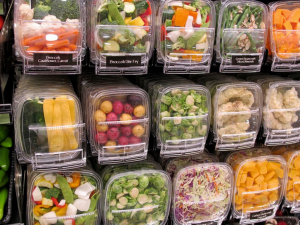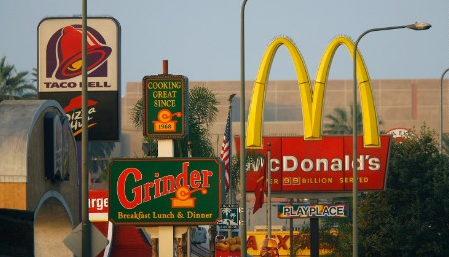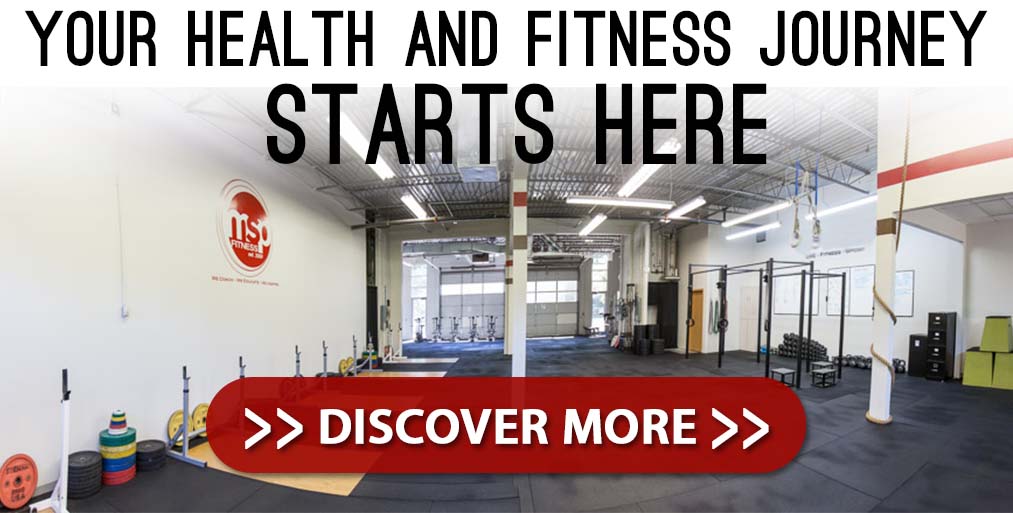You Know The Place. We’ve All Been There.
That special spot where once you arrive you immediately realize your nutritional options have gone from feast to famine. Today I’m talking about Food Deserts — places on the map where quality cuisine is not an option.

Perhaps your most recent brush with one of these destinations was on a work trip to small town America. Or maybe yet, the last time you visited your in-laws, logged a long road trip, or spent the day in a neighborhood across town from your own. Regardless the size, we’ve all felt trapped by the problem these Food Deserts create: a lack of favorable food choices.
When you’re home, you’ve got your nutrition on lock. You cook most meals and make good choices when you dine out — all fostering a habit of health in your home kitchen. But what happens when you leave home? How do you continue your habits on the road or abroad? And probably most importantly… What on earth do you do when there’s no Chipotle at your layover airport?!?

What do you mean Guac is extra?
Today I’ve got Four tactics you can utilize whilst traveling outside of your food comfort zone. Here they are…
1. Non-Perishables are Your Friend.
For starters, I’ll drag up the old maxim, “Those who fail to plan, plan to fail.” A little cliche I know, however preparation is the first step to succeeding in a Food Desert. Chances are, you weren’t air dropped into Central Nebraska for that family reunion. No. You were invited and consciously made the trip out. Riding off a similar thought logic, I’ll share my own modern adage of the same dilemma, “People don’t wind up at McDonalds accidentally.” So what can you do?
Bringing non-perishable foods can make all the difference in a sticky dining situation. If your family was anything like mine growing up (and most families weren’t), when Dad said, “We’re hitting the road in twenty!”, you start packing canned goods in your duffel, because on road trips, he never stopped. Not my recommendation for those seeking to maintain an appearance of normalcy. That being said, there are two products I love for folks who know they’re headed into the belly of the beast.
EPIC Provisions is a meat-based foods company crafting bars, bites, meat strips, and a host of other tasty products. What I love about them is they’re making a whole foods variation of the classic protein bar. Instead of a product that more or less resembles a candy bar, they’ve created a food item from the highest quality of protein available: animal protein. Furthermore, it’s a grab’n’go meat option unaccompanied by the caloric excess found in other convenience store meat snacks. I have no doubt you’ll love their brand (as they rock a pretty righteous mission), but you’ll also benefit from a quality Food Desert go-to.

EPIC’s Bison bar. Just one of many meat options.
Athletic Greens is a supplement, and as with any supplement, come’s with its own lion’s share of marketing mumbo jumbo. In an attempt to find the signal in the noise, here’s what I like about athletic greens: it can momentarily fill in your gaps. In the midst of a Food Desert, veggies are sparse. And unless you’re counting jello salad, finding something green is hard. Taking a greens supplement, any greens supplement, can be a solid, momentary option for navigating the absence of quality whole foods.

Athletic Greens
2. Coolers are Cool.
I can’t tell truthfully tell you if coolers are actually the cat’s pajamas. It’s probably just be something I tell myself. Nonetheless, I stand firmly by the use of a lunch box or portable cooler to transport food into a Food Desert. BYO is single the best method for mitigating the pitfalls associated with poor nutritional options. Two issues though: people’s perception of you and food safety. The latter one actually matters, while the former is between you and you alone.
So if we’re going to commit to packing up some hard boiled eggs and precut veggies for the trip ahead, what are our biggest concerns?
- 40°F. Forty degrees is the threshold for keeping bacteria from growing more rapidly. To prevent the rise in temp, pack along some ice. For those traveling to a destination with a freezer, just pack a refreezable gel pack. You’ll save on the need to open the cooler to re-ice (inadvertently cooling its contents), and you’ll save on the mess. Note: if your hotel/motel mini fridge doesn’t have a freezer, the employee lounge or hotel kitchen likely will. I’ve had many a gel packs stored by very compliant front desk attendees over the years. All you need do is ask.
- Pack Tight. You don’t need the biggest cooler. In fact, smaller is better as your food items will stay better insulated with less free space. A soft cooler can be a better option as the walls are flexible to fit your space needs.
- Use Tupperware. Whatever your brand is, use it. You’ll optimize your space economy and keep your produce from smashing and squishing each other. No one likes hummus crushed strawberries.

How I feel about tupperware. Photo credit to Jujimufu. We are not worthy.
3. Go To The Grocery Store.
If a town has a Dairy Queen, they have a grocery store. Don’t let your health/nutrition goals be derailed by your unwillingness to use Google Maps before your trip begins. Scout out where the local grocers are at and how far they are from your lodging. Can you walk? Could you Uber? I’ve used both depending on destination. Make no doubt, when you’re staring down a Food Desert, grocery stores are your best friend.
Nowadays, nearly every grocery store has a section within their larger produce department carrying pre-cut vegetables, fruits, and other produce options. This can be a dynamite opportunity to pick up some sliced zucchini to munch on with salsa, carrots and radishes to dip with guacamole, or convenient fruit staples like apples, oranges, and bananas. While you’re there, stock up your cooler for the next leg of your journey.

Example of pre cut vegetables.
4. Fall Back on Your Background.
The above three points are great suggestions (I know.. I wrote them), yet in your own Food Desert you will inevitably find yourself without. You might be out to dinner with a client, amongst a group of friends ordering pizza, or obligated to attend a function catered by a company who only fries their food. When all hope seems lost it isn’t. You see, healthy eating and living isn’t defined by what you ate while on a four day work trip. Health isn’t what ended up on your plate at that small town diner last time you visited your brother. No. Health is cultivated over a long period of time. A cultivation you’ve been working hard on.
So if, and when, all your Food Desert plans go to hell in a hand basket, fall back on that consistent cultivation of health. Make informed restaurant and menu choices, make intuitive eating selections, and submit to the realization that health ought to be observed from 30,000ft, not under a microscope.
Wrapping up:
And so, I don’t care what your sister in-law thinks of your homemade beef jerky, or what the flight attendant wonders when checking out your kick ass cooler. It’s not someone else’s health and/or dietary goals, it’s YOURS. Your food choices must be for you and your values, not others’. To that end, implement a few of these strategies to help you maintain those values while in the middle of a Food Desert. Be prepared, plan to succeed, and when in need, fall back onto the health you’ve been cultivating for the longterm. You got this!
Author’s note:
I recognize and want to bring to your attention that the term “Food Desert” has recently been used by the USDA to describe locations where there is limited access to affordable healthful foods, predominately affecting residents of low-income areas in both inner cities and rural areas as well. That nutritional void is a tragedy, yet it won’t be discussed in this piece. For more resources and information regarding the American Nutrition Association’s coverage of Food Deserts, visit this web page.



